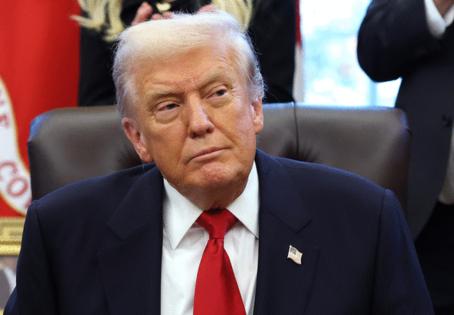Trump defends foreign students as 'good' for US universities
Published in Political News
WASHINGTON — President Donald Trump defended allowing foreign students to study in the United States as a “good” practice and pushed back on a call to reduce their numbers, saying it would be financially destructive to the nation’s higher education system.
“You don’t want to cut half of the people, half of the students from all over the world that are coming into our country — destroy our entire university and college system — I don’t want to do that,” Trump said in an interview with Laura Ingraham that aired Monday on Fox News.
“I actually think it’s good to have outside countries. Look, I want to be able to get along with the world,” he added.
Trump was repeatedly pushed by the Fox News host on why he wouldn’t reduce the number of students from foreign countries — in particular China — who are studying in the U.S., with Ingraham casting it as a policy the president’s supporters would back and a change that would make it easier for Americans to enroll in schools.
Trump argued that reducing the numbers of foreign students would cause financial harm to the university system and lead some schools, including historically Black institutions, to go “out of business.”
“We do have a lot of people coming in from China, we always have China and other countries. We also have a massive system of colleges and universities. And if we were to cut that in half, which perhaps makes some people happy, you would have half the colleges in the United States go out of business,” Trump said.
“We take in trillions of dollars from students. You know, the students pay more than double when they come in from most foreign countries. I want to see our school system thrive,” he added. “It’s not that I want them, but I view it as a business.”
Trump’s comments offer a contrast with policies his administration has carried out that have targeted international students. The administration has revoked thousands of visas, arrested students who were involved in pro-Palestinian activities and imposed heightened application requirements.
The administration has also targeted top-tier institutions over their handling of international student applicants and compliance with visa regulations. Harvard University challenged the administration’s attempt to block the school from admitting foreign students. A judge blocked the administration from enforcing the ban, but the U.S. is appealing that decision.
Trump earlier this year also announced that he would begin revoking the visas of Chinese students, a move intended to obtain leverage in trade talks with Beijing, but later retreated as part of a broader truce on tariffs and export controls between the two countries.
Officials have also moved to reduce the number of foreign students as part of a proposed compact with colleges that would give them preferential access to federal funds. The effort, dubbed the “Compact for Academic Excellence in Higher Education,” would include a cap on international students that limits undergraduate numbers to no more than 15% of students on foreign visas, with no more than 5% of students coming from any one country.
Earlier this year, Secretary of State Marco Rubio ordered U.S. embassies worldwide to stop scheduling interviews for student visas, with the administration later resuming them but with more strict vetting of applicants’ social media profiles.
_____
(With assistance from Liam Knox.)
©2025 Bloomberg L.P. Visit bloomberg.com. Distributed by Tribune Content Agency, LLC.
























































Comments